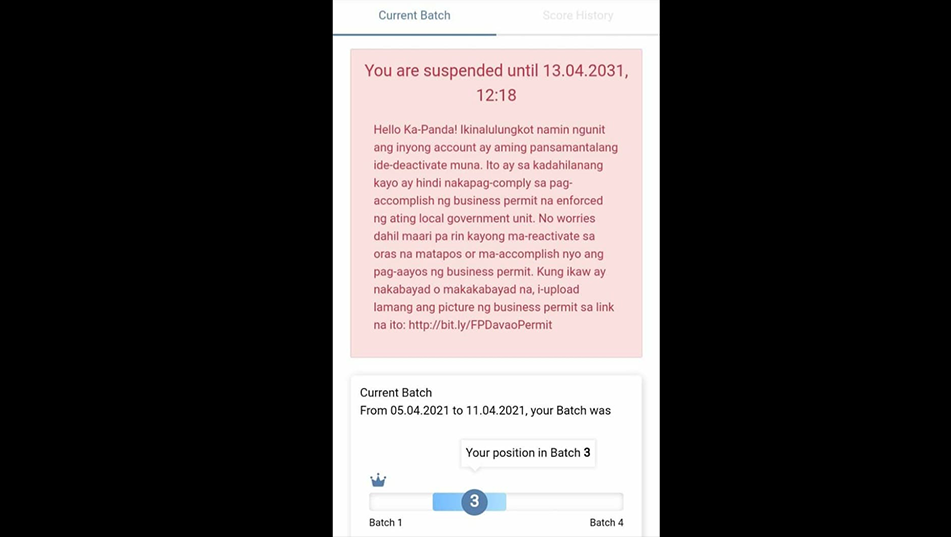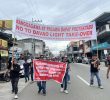DAVAO CITY, Philippines – It was lunchtime when Roger (not his real name) received a notification that his FoodPanda delivery account has been temporarily suspended for his failure to comply with the city government’s business permit requirement for delivery riders.
Roger had only P300 in his pocket that day, insufficient to pay the amount to process his business permit. Like him, many other food delivery riders received the same information on April 13, 2021 notifying them of the suspension of their accounts because they do not have their permits the city government enforced since February 28, 2021. It will only be reactivated once they could upload their permit to the link the company has provided them.
“I don’t have a choice, Ma’am. I had to borrow at a 5-6 (loan sharks) because I do not have money,” Roger, scratching his head, said in local dialect.

DISABLED. This is the notification that FoodPanda riders received on April 13, informing them that their accounts have been disabled due to failure to comply with the city’s business permit requirement for delivery riders.
‘Unjust Fees’
To acquire this business permit a rider must pay more than P4,000 a year which will cover the following fees: electronic, garbage, mechanical, plumbing, sanitary permit, signboard, sanitary inspection, solid waste and zoning.
On top of this, they are also required to register at the Bureau of Internal Revenue (BIR) for another annual registration fees and the monthly filing of income taxes.
Boyet, who asked Davao Today not to reveal his real name, said they (riders) have to pay P500 to get a barangay (village) certification, a requirement before the riders can process their permit at the city’s business bureau.
Then, there is the additional fee for the renewal of the registration of each rider’s motorcycle of P500 for the Land Transportation Office (LTO) official receipt and certificate of registration (OR-CR).
The fees seem endless as the riders have to pay for the occupational permit of P125 and the health card worth of P100 yearly.
Boyet said FoodPanda informed them about the business permit in January this year and cited the provisions in the amended Revenue Code of Davao City but it did not provide further explanation about the permit which left the riders with more questions.
He recalled FoodPanda giving them option to pay for the business permit through the company’s bookkeepers to free the riders from the hassle of queuing at the city’s business bureau office, but it would cost them another P1,200.
Most of the riders haggled with the company to pay for their permit and deduct the payment from their weekly salary, but it did not materialize.
“They (FoodPanda) could not answer our questions at that time, Ma’am. They just told us to pay so that our accounts won’t be suspended,” Boyet said.
Suspend Collection
Davao City Councilor Pamela Librado-Morata raised the issue to the City Council during its regular session on April 13 where she criticized the collection as ‘’impractical and inequitable’’ during this pandemic.
Prior to bringing the issue to the council, Librado-Morata had asked several riders about their working condition. To alleviate the plight of delivery riders, she filed the resolution, ‘’Urging FoodPanda and All Other Similar Entities and the City Business Bureau to Suspend the Collection of Fees for Food Delivery Riders in Davao City.’’
The councilor disclosed that food delivery companies operating locally have classified their delivery riders as ‘’independent contractors’’ or merely ‘’business partners’’ relieving these delivery companies from their obligation to provide standard wages and benefits and fair working terms and conditions for delivery riders.
“There is a need to properly situate them as new and emerging workforce (delivery riders) whose plight deserves attention and proper action from the local government,” she said.
Librado-Morata is set to file another legislation related with this issue in the next City Council session.
Dire Working Condition
Roger estimated about 3,000 FoodPanda delivery riders in Davao City which have been split into four batches to determine their monthly incentives based on their performance evaluation within a month.
Those riders who get the incentive of P15 per distance of delivery belong to batch 1, the next is P6 for batch 2, and P3 for batch 3 while those who perform poorly are the batch 4 riders who do not have regular schedule and whose shifts fall on at dawn.
“This batch scheme resulted from the limitless hiring of riders because of the commission the company gets with new hires. Despite the huge volume of orders, the increasing number of new riders would always limit our deliveries because these orders have to be distributed to all riders,” Roger said.
Boyet said that riders in Batch 1 could earn at least P7,000 net income per week but the unstable schedule of delivery does not anymore guarantee it could be earned on a weekly basis.
In a month, a rider spends P1,200 for load allowance, P4,500 on gasoline (at P150 per day) and P350 for motorcycle maintenance. Most riders have to also allot about P2,500 to P6,000 (depending on the model) for the installment payment of their motorcycle units usually payable in three to five years.
“So, come to think of it, we are still short considering the expenses we incur compared to our earning. And here comes these additional fees. This is just too much,” Boyet added.
Since the pandemic, Roger said they have been spending from their own pockets to buy their protective equipment. The company only provides a raincoat and uniform once a rider starts working.
Davao Today tried to reach a certain Mr. Yu who the riders identified as their operations head in Davao City for an interview, but his mobile number could no longer be reached. (davaotoday.com)
Food delivery riders, FoodPanda







